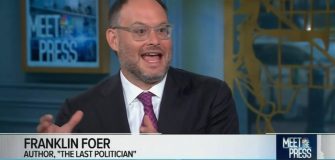On Vivek & the Right’s State of Play
Share

So it’s no surprise that Ramaswamy’s op-ed has also drawn a fair share of criticism. Jacob Heilbrunn, in an essay in the Atlantic, writes, “Like more than a few Republicans these days, Ramaswamy is obsessed with China, which he depicts as the locus of evil in the world, and cavalier about Russia, which stands accused of perpetrating war crimes in the heart of Europe.”
As Sohrab Ahmari pointed out on this week’s TAC Right Now, Ramaswamy’s position on Taiwan—a move from ‘strategic ambiguity’ to ‘strategic clarity’ and then back once economic independence has been achieved—is in many ways a noteworthy outlier in a Republican primary that has seen near-uniformity on the issue.
But for Heilbrunn, Ramaswamy’s desire to end the war in Ukraine, including by negotiating with Putin if necessary, is particularly troubling. Heilbrunn, the editor of the National Interest, has been concerned about Ukrainian interests since Russia’s invasion, and his criticism of Ramaswamy runs along similar lines:
[Ramaswamy] proposes to bow to Russian suzerainty over the territories it controls in eastern Ukraine and oppose Ukrainian membership in NATO “in exchange for Russia exiting its military alliance with China.” But as others have noted, those two countries do not have a military alliance. In any case, Putin has repeatedly displayed no interest in serious peace negotiations over Ukraine, a country that he remains wholly intent on reducing to the status of an imperial Russian colony.
Heilbrunn is right, though, that foreign policy is exposing real rifts in the GOP. As I’ve written previously, it’s the one issue candidates seeking to claim the non-Trump lane resort to first when asked to differentiate themselves from the 45th president. Heilbrunn frames the rift this way:
The Wall Street Journal denounced [Ramaswamy] for seeking to sell out Ukraine, and National Review asked whether “he’s auditioning for a geopolitical game show instead of the presidency of the United States.” To some extent, his comments can be dismissed as bluster. But he and his fellow self-proclaimed realists—a cluster of activists and thinkers at places such as The American Conservative, the Claremont Institute, and the Heritage Foundation—are responding to a genuine, if dismaying, phenomenon in the American electorate.
“Wall Street Journal & National Review” vs. “TAC, Claremont, & Heritage” seems to be a fairly accurate way of describing the state of play. Fortunately for us, the voters are overwhelmingly on our side.













